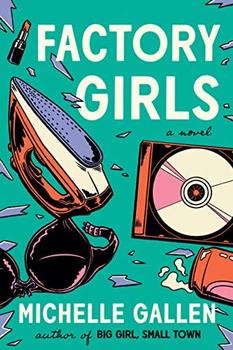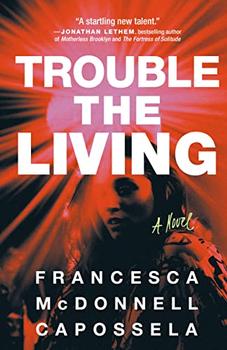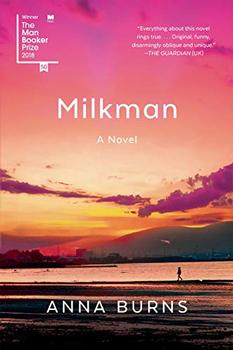Summary | Excerpt | Reviews | Beyond the book | Read-Alikes | Genres & Themes | Author Bio

"[D]espite having seen movement after movement rise up and crash like waves on a shore, Maeve wished that one demonstration would work. That something'd bring an end to the violence." Raised in a community that has seen more violence than most, Maeve Murray — the sharp-tongued, crassly vulnerable heroine of Michelle Gallen's Factory Girls — enters her first summer of adulthood with a handful of goals. She wants to get a job at the town shirt factory and save as much as she can; she wants to move out of her parents' house, where she still lives in the bedroom she shared with her older sister before Deirdre killed herself; and she wants to pass her exams so she can get out of her small Northern Irish town and study journalism in London. Bolstered by her best friends, Maeve lands the job (learning how to operate an industrial ironing press and suffering not a few injuries in the process) and a new flat. Now she just has to survive a summer dodging both real and metaphorical projectiles: the continued gunfire resulting from hostilities between the different factions of the Troubles as well as the barbs sent her way by her new coworkers, the first Protestants with whom Maeve, who attended school in North Ireland's segregated system as a Catholic (see Beyond the Book), has ever meaningfully interacted.
Gallen walks her narrative tightrope perfectly, balancing within Maeve's first-person account a story grounded in the horrific realities around her with the more ordinary — but still impactful, both to the protagonist and to readers — pains of growing up and of seeing one's girlhood fading rapidly away. Though Maeve (like Gallen) had a childhood scarred with violence, the harsh emergence into adulthood still comes as a shock. Gallen tempers this somewhat by adding flashback scenes throughout Factory Girls that allow Maeve a more introspective tone than in her normal stream of consciousness. In the present day, however, she can hardly fend off the effects of long hours, physical pain and sexual assault from her boss at the factory. Despite this, the idea of unionizing — of forming any kind of alliance with "the other side" — is an impossible one in her mind.
While I initially thought that the characters' interest in organizing against their oppressive boss came too far along in the narrative, I later realized that there is a method to Gallen's structure. The main point of Maeve's story is not, necessarily, managing to form a large-scale disruption with her fellow workers. Rather, it is her ability to engage in small, personal acts of revolution. One of these is shown in her memory of walking out from a patronizing peace choir concert in grade school; her flashback to the group of English vocalists who came to sing about the importance of peace is darkly funny. The singers' naiveté, versus the jaded knowledge of the Northern Irish schoolchildren, went over poorly to say the least. During the book's main events, Maeve walks out again, this time on an IRA leader once she realizes he has no intention of protecting the workers — particularly the women — from their abusive boss. Maeve's capacity for humor, too, stands out as her way of pushing back against the violence and sorrow of the Troubles. And to her parents, who still grieve their eldest daughter with a ferocity that is apparent despite their relatively few appearances and the narrator's clouded, teenage perspective, one of Maeve's greatest successes is "to keep breathing, which was all they ever wanted her to do."
Factory Girls brings the simmering, ever-present fear of the Troubles directly to readers through Maeve's descriptive observations, littered with memories of the haunting violence she has witnessed throughout her childhood. While her female friends leap off the page (Fidelma Hegarty in particular is the sort of badass who could lead an action franchise in another life), the male characters aren't quite as fleshed out — Maeve's possible love interest James stays within the posh best-friend's-brother archetype, and the scummy factory owner, "Handy" Andy Strawbridge, receives no character growth nor, in my opinion, enough payback for his abusive behavior by the end of the novel. But Factory Girls is about the girls — Maeve and her friends, the women in the factory, Maeve's mother, even the memory of Maeve's sister Deirdre — and Gallen paints each of them with the subtle tenderness only a mouthy, whip-smart narrator could manage.
![]() This review
first ran in the January 18, 2023
issue of BookBrowse Recommends.
This review
first ran in the January 18, 2023
issue of BookBrowse Recommends.

If you liked Factory Girls, try these:

by Francesca McDonnell Capossela
Published 2023
From Northern Ireland to Southern California and back―a mother and daughter confront the violence of the past in an enthralling novel about the possibility of love and redemption during the most transforming and unsettled times.

by Anna Burns
Published 2018
Winner of the 2018 Man Booker Prize, Milkman is a tale of gossip and hearsay, silence and deliberate deafness. It is the story of inaction with enormous consequences.
Your guide toexceptional books
BookBrowse seeks out and recommends the best in contemporary fiction and nonfiction—books that not only engage and entertain but also deepen our understanding of ourselves and the world around us.